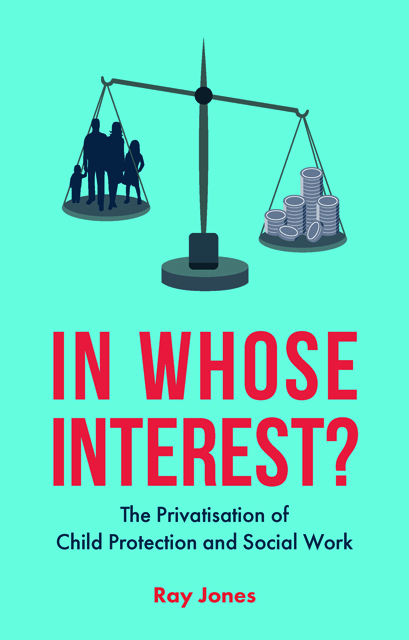nine - The experience and outcomes of privatising public services
Published online by Cambridge University Press: 14 April 2023
Summary
When pursuing any policy or service change it is wise to be reflective and to learn from the impact of similar changes elsewhere. There is plenty of scope as statutory children’s social services and social work are positioned for privatisation to consider what have been the outcomes of moving other very personal public services into a commercial marketplace. This chapter tracks what has happened to the welfare state public services that were set up following the Beveridge Report in the 1940s and those set up to tackle what in the previous chapter were called the more contemporary concerns: public safety to tackle fear and threat, and care to tackle neglect.
Schools, education and children’s centres
First, the Beveridge giant of ‘ignorance’. It was the New Labour government of Tony Blair which provided the platform and process to move publicly funded schools out of the direct control and support of local authorities. Academy schools – like the thrust towards patient choice and creating a market in hospital services – fitted within the public policy initiatives championed by Julian Le Grand to develop ‘quasi-markets’ in public services where there would be competition between schools and between hospitals.
New Labour’s stated intention was that schools which were seen to be poor performers would be moved outside of local authority control, with the local authority itself assumed to be failing, and the school would receive its funding, enhanced by the government, direct from the Department for Education. The school would be given freedoms to design its own curriculum and staffing arrangements and terms and conditions of employment, without the constraint of national requirements, and would be assisted to improve by a sponsor from business or charities.
For New Labour, academy schools were not intended as a mainstream development. They were to be a specific initiative to tackle a specific difficulty – schools which were scoring low on Ofsted inspections and exam performance data and were often located within areas of high deprivation that provided their pupil catchment area. But as with several other New Labour initiatives, it crossed a threshold, broke through a barrier and became a Trojan horse letting in ideologically driven policies of the following Conservative governments.
Information
- Type
- Chapter
- Information
- In Whose Interest?The Privatisation of Child Protection and Social Work, pp. 177 - 230Publisher: Bristol University PressPrint publication year: 2018
